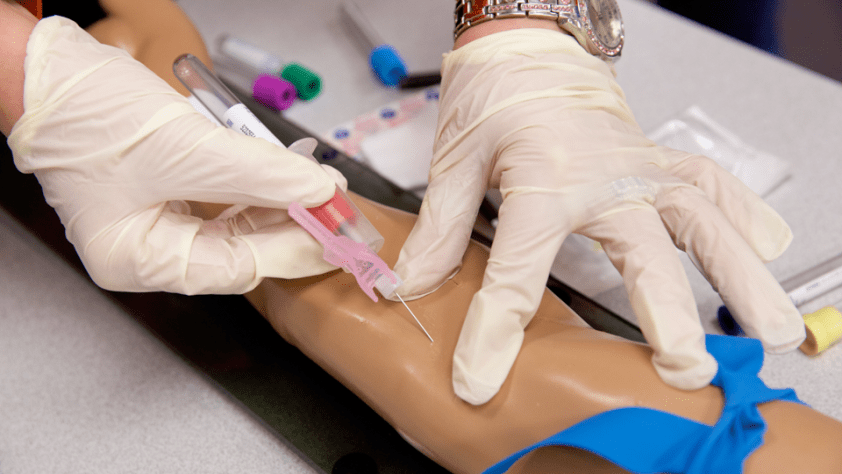Phlebotomy school Success: A Student’s Guide to Excelling in Class and Clinic
Wiki Article
The Course to Qualification: Recognizing the Phlebotomy Educating Training Course Trip and Its Importance
As you consider the course to qualification in phlebotomy, it's vital to understand the role you'll play in health care. Your training will cover crucial abilities, from blood collection methods to patient interaction.
The Role of Phlebotomists in Medical Care
Phlebotomists play an essential duty in the medical care system, serving as the important web link between people and vital analysis testing. You'll execute blood attracts, making certain samples are gathered accurately and safely. Your know-how aids in diagnosing medical problems, keeping track of wellness, and directing therapy decisions.In your daily interactions, you'll require to develop trust with clients, making them really feel comfy throughout what could be a stressful experience. You are accountable for identifying and taking care of samples carefully to avoid contamination or mistakes, which can influence test results.
Yet, you'll often work alongside medical professionals and nurses, interacting critical information regarding individuals' problems. Your duty is essential in keeping the process in medical care settings, making certain timely and exact outcomes. By grasping your abilities, you add meaningfully to client care, making you an important part of the clinical group. Embracing this responsibility is essential to your success as a phlebotomist.
Summary of Phlebotomy Training Programs
When checking out phlebotomy training programs, you'll discover various types developed to fit various timetables and discovering styles. Each program helps you create crucial abilities like blood collection and patient interaction. Recognizing these alternatives is essential to choosing the best path for your job.Kinds Of Educating Programs
A number of kinds of training programs are offered for those aiming to become efficient in phlebotomy. You can select from certification programs, which normally last a few months and concentrate on crucial abilities. There are likewise diploma programs that supply a more complete education, often lasting up to a year. If you're trying to find a much deeper understanding, an associate degree in a relevant field could be the best fit. On the internet programs use versatility for those stabilizing work or family commitments, enabling you to research at your very own speed. In addition, some medical facilities and centers provide on-the-job training programs, providing sensible experience while you learn. Whatever path you pick, each program intends to outfit you with the needed skills for an effective phlebotomy occupation.
Secret Skills Established
Mastering phlebotomy needs a set of essential abilities that are created through complete training programs. You'll learn technological skills like proper vein selection, needle insertion, and blood collection strategies. These hands-on techniques ensure you can do treatments securely and successfully. Additionally, interaction skills are basic; you'll require to connect with patients, discuss procedures, and put them comfortable. Recognizing composition and physiology is crucial, also, as it assists you situate blood vessels and recognize the body's reaction to blood attracts. Finally, you'll obtain knowledge of safety protocols and infection control, assuring you keep a sterile environment. Each of these skills is necessary for your success as a certified phlebotomist, making you an important possession in any type of health care setting.Trick Components of a Phlebotomy Program
In a phlebotomy training course, you'll concentrate on vital subjects that prepared for your future profession. You'll engage in hands-on training that enables you to apply what you've discovered in real-world settings. Both the curriculum and functional experience are crucial for your success as a phlebotomist.Core Educational Program Summary
While pursuing a phlebotomy training course, you'll encounter a curriculum developed to equip you with basic skills and knowledge. Phlebotomy Classes Near Me. This educational program generally consists of makeup and physiology, focusing on the blood circulation system and recognizing blood elements. You'll additionally learn more about different types of blood collection techniques, including venipuncture and capillary puncture techniquesFurthermore, infection control and safety and security protocols are necessary components, guaranteeing you recognize just how to preserve a sterile atmosphere. You'll study patient communication, emphasizing interaction and compassion, which are critical for relieving person stress and anxiety. Honest and legal factors to consider will certainly be dealt with, preparing you for real-world duties. This foundational knowledge will certainly Phlebotomy Classes Near Me enable you to excel as a phlebotomist and offer top quality care in scientific settings.
Hands-On Training Experience
Getting hands-on experience is an essential part of your phlebotomy training course. This functional training enables you to use what you've learned in a real-world setup, enhancing your skills and confidence. Phlebotomy school.In addition, you'll get the chance to communicate with patients, which is essential for developing your interaction skills. This combination of technological proficiency and social skills is crucial for your success as a qualified phlebotomist. Ultimately, hands-on training is where concept satisfies technique, solidifying your understanding and preparedness for qualification.
Certification and Licensing Demands
Prior to you can begin your career in phlebotomy, it is important to comprehend the accreditation and licensing demands that vary by state. Many states need phlebotomists to hold a certification from an acknowledged organization, such as the National Phlebotomy Association or the American Culture for Medical Pathology. These qualifications commonly entail passing a test that examines your understanding and skills in the field.Along with certification, some states have specific licensing needs. You may require to complete a certain variety of hours in professional method, send evidence of training, or undergo a background check. It is crucial to research your state's laws to make certain you fulfill all necessary requirements.
Remaining notified regarding these demands not only helps you safeguard a setting yet also boosts your reputation as an expert. By satisfying these needs, you'll be well on your means to an effective career in phlebotomy.
Hands-On Training and Practical Experience
Hands-on training and sensible experience are essential parts of your phlebotomy education, as they permit you to use theoretical understanding in real-world situations. During your training, you'll engage in monitored venipuncture, find out correct techniques, and end up being knowledgeable about different blood collection tools. This direct involvement is important for building your self-confidence and honing your abilities.You'll function carefully with skilled specialists who can guide you via the nuances of person interaction and sample handling. Each session not only enhances your understanding yet also prepares you for the fast-paced setting of medical care setups.
Additionally, many programs include professional rotations, enabling you to experience diverse settings, from medical facilities to outpatient facilities. This direct exposure helps you adjust to different obstacles and client needs, ensuring you're well-prepared for your future function. Welcome these chances, as they're vital to becoming an experienced and caring phlebotomist.
Obstacles Dealt With During Training
While gaining hands-on experience is necessary, it's vital to identify the challenges that can emerge during your phlebotomy training. You may come across anxiety when performing procedures on genuine patients, especially if you're new to the setting. The stress to get everything right can be overwhelming. In addition, grasping the skills needed for blood draws takes technique; you may struggle with technique initially.Time administration can additionally be a hurdle, as harmonizing theory, useful sessions, and personal dedications can feel challenging. You might face varying discovering paces among your peers, leading to sensations of insecurity if you believe you're falling back. Adapting to the different personalities of teachers can be difficult, as each may have a distinct training style.
Recognizing these barriers early on can prepare you for success and assist you create resilience throughout your training journey.
Job Opportunities After Certification

As you obtain experience, you could also take into consideration specializing in locations like pediatric or geriatric phlebotomy, accommodating details patient needs. Some phlebotomists select to advance their professions by ending up being lab specialists or going after further education and learning in healthcare areas.
In addition, your certification can result in functions in training or managing new phlebotomists, enabling you to share your expertise. With the healthcare sector continually expanding, your skills will constantly remain in demand, leading the means for a steady and satisfying career. Embrace the opportunities waiting on you!
Frequently Asked Concerns
What Is the Normal Period of a Phlebotomy Educating Program?
Phlebotomy training programs normally last around four to eight weeks. You'll engage in hands-on method, class guideline, and online knowing. Completing this training prepares you for accreditation and a fulfilling profession in healthcare.Are Online Phlebotomy Courses Available?
Yes, on the internet phlebotomy courses are available. They provide adaptability and convenience, enabling you to study at your very own pace. Simply validate the program is approved to satisfy certification demands and gain important abilities for your job.Just How Much Does Phlebotomy Training Generally Price?
Phlebotomy training normally costs between $700 and $2,500, relying on the program and area. You ought to consider aspects like training course size, included products, and hands-on experience when picking the appropriate training for you.What Prevail Prerequisites for Phlebotomy Training?
Common requirements for phlebotomy training commonly consist of a senior high school diploma or GED, immunizations, and a background check. Some programs may likewise need standard healthcare knowledge or qualifications, ensuring you're planned for hands-on training.Can I Work While Completing My Phlebotomy Training?
Yes, you can work while completing your phlebotomy training. Several pupils equilibrium tasks with their researches, yet ensure to manage your time effectively to assure you satisfy both work and training commitments successfully.Report this wiki page